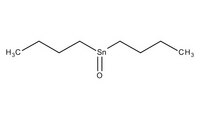803539 Sigma-AldrichDibutyltin oxide
Dibutyltin oxide for synthesis. CAS 818-08-6, chemical formula (CH₃CH₂CH₂CH₂)₂SnO.
More>> Dibutyltin oxide for synthesis. CAS 818-08-6, chemical formula (CH₃CH₂CH₂CH₂)₂SnO. Less<<Synonyms: Dibutyloxostannane
Recommended Products
Overview
| Replacement Information |
|---|
Key Specifications Table
| CAS # | EC Number | Hill Formula | Chemical Formula | Molar Mass |
|---|---|---|---|---|
| 818-08-6 | 212-449-1 | C₈H₁₈OSn | (CH₃CH₂CH₂CH₂)₂SnO | 248.92 g/mol |
Pricing & Availability
| Catalog Number | Availability | Packaging | Qty/Pack | Price | Quantity | |
|---|---|---|---|---|---|---|
| 8035390005 |
|
Glass bottle | 5 g |
|
— | |
| 8035390250 |
|
Plastic bottle | 250 g |
|
— |
| Description | |
|---|---|
| Catalogue Number | 803539 |
| Synonyms | Dibutyloxostannane |
| Description | Dibutyltin oxide |
| References |
|---|
| Product Information | |
|---|---|
| CAS number | 818-08-6 |
| EC number | 212-449-1 |
| Hill Formula | C₈H₁₈OSn |
| Chemical formula | (CH₃CH₂CH₂CH₂)₂SnO |
| Molar Mass | 248.92 g/mol |
| HS Code | 2931 90 00 |
| Structure formula Image | |
| Quality Level | MQ200 |
| Applications | |
|---|---|
| Application | Dibutyltin oxide for synthesis. CAS 818-08-6, chemical formula (CH₃CH₂CH₂CH₂)₂SnO. |
| Biological Information |
|---|
| Dimensions |
|---|
| Materials Information |
|---|
| Toxicological Information | |
|---|---|
| LD 50 oral | LD50 Rat 487 mg/kg |
| LD 50 dermal | LD50 Rabbit > 2000 mg/kg |
| Safety Information | |
|---|---|
| Categories of danger | harmful, irritant, dangerous for the environment |
| Product Usage Statements |
|---|
| Storage and Shipping Information | |
|---|---|
| Storage | Store below +30°C. |
| Packaging Information |
|---|
| Supplemental Information |
|---|
| Specifications | |
|---|---|
| Assay (ex Sn) | ≥ 98.0 % |
| Identity (IR) | passes test |
| Global Trade Item Number | |
|---|---|
| Catalog Number | GTIN |
| 8035390005 | 04022536381923 |
| 8035390250 | 04022536381930 |
Documentation
Dibutyltin oxide SDS
| Title |
|---|
Dibutyltin oxide Certificates of Analysis
| Product Number | Packaging | Specification | Lot Number |
|---|---|---|---|
| 8035390005 | Glass bottle | PDF Specification Document | |
| 8035390250 | Plastic bottle | PDF Specification Document |











